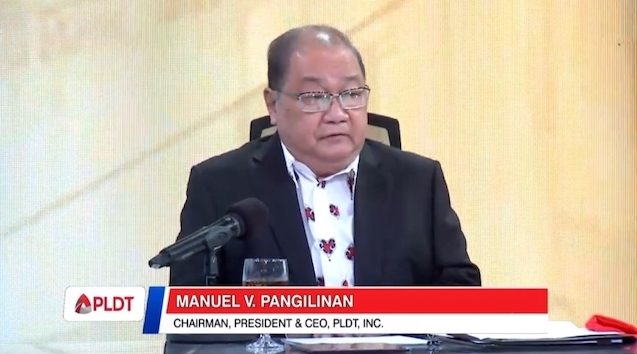SUMMARY
This is AI generated summarization, which may have errors. For context, always refer to the full article.

MANILA, Philippines – High-tech greenhouses, online medical diagnosis of diseases, and mapping the country’s supply chain are just some of the digital solutions that tycoon Manny Pangilinan is looking into, as the Philippines struggles to adapt to the coronavirus pandemic.
Under the so-called new normal, futuristic solutions to problems aggravated by the pandemic are inching closer to becoming reality, according to the 73-year-old tycoon.
During PLDT’s annual stockholders’ meeting held online on Tuesday, June 9, Pangilinan enumerated some of the ways that the company can help the government, as well as some of their business prospects.
Mapping supply chains. Pangilinan said PLDT is willing to help the government in creating a digital map of the country’s supply chain.
With the digital map, the government can track the source of raw materials for food and pharmaceutical products, as well as which markets these goods go to.
“Mapping the country’s logistical infrastructure should be part of the digital supply chain blueprint,” Pangilinan said.
National ID. The tycoon also said PLDT is prepared to help implement the national ID system to conduct contact tracing and tracking during a crisis.
“This national ID, complemented by existing digital payment gateways, can make the distribution of government cash subsidies more efficient, since funds can be disbursed directly to individual recipients. This also enables the private sector to help with funding and subsidies,” he said.
High-tech agriculture. The PLDT group announced that it is also looking at getting into the food production space through high-tech greenhouses to produce vegetables.
“Later, we will consider producing other staple food, including rice, on an industrial scale,” Pangilinan said.
“Food security is critical to our people in a crisis. We cannot rely on imports which could be withheld in times of emergency.”
Online health services. For the health sector, PLDT is working with hospital companies under the Pangilinan group to supply services remotely, as well as devices which could read vital signs and transmit data to doctors digitally.
The group is also looking at technology that can digitally furnish diagnosis to patients.
“This is internet-of-things or IOT at work in the health space,” Pangilinan said.
E-learning. For the education sector, Pangilinan said PLDT is working with the Department of Education to digitalize the education ecosystem. (READ: Distance learning: A looming crisis for students with special needs)
PLDT has already recommended various digital solutions, from learning management systems, digital infrastructure, wireless and fiber plans, to digital devices for students and teachers. (WATCH: Rappler Talk: Education in the time of coronavirus)
Business environment
As Pangilinan enumerated the digital solutions, he also admitted that the business environment remains challenging, with PLDT’s profits taking “a back seat.”
PLDT has slashed capital expenditures in 2020 by over P20 billion, from P83 billion to around P60 billion.
PLDT posted strong revenue growth of 9% to P41.5 billion in the 1st quarter of 2020, as people used up more data while holed up in their homes.
Mobile revenues jumped nearly 40%, while telco core income was lower by 5% to P6.9 billion.
“We should remind ourselves that COVID-19 is the perfect storm. It isn’t just a national crisis, it is also an economic crisis so vast and devastating, with consequences on lives and businesses that have yet to be fully felt,” Pangilinan said.
“We have to allow the blast effect of the pandemic to take its full course, before we’re able to furnish guidance numbers with some precision.”
Going digital is also going to be a challenge, as it requires better infrastructure. The World Bank on Tuesday reiterated that the Philippines lags in broadband penetration compared to regional peers.
PLDT has also said that the highly-anticipated 5G rollout was pushed back to the last quarter of 2020. – Rappler.com
Add a comment
How does this make you feel?
There are no comments yet. Add your comment to start the conversation.